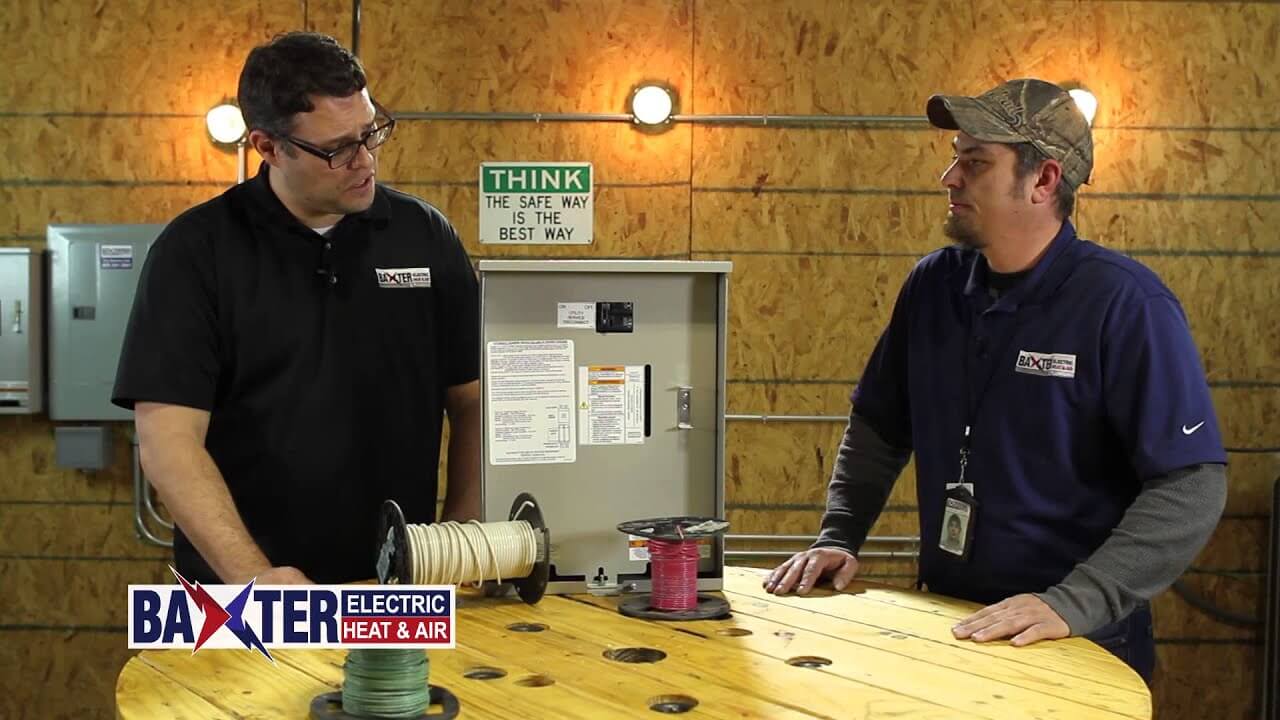Should I Get a Portable or Standby Generator?
When the power unsuspectingly goes out throughout the neighborhood, it’s typically when you’re relaxing watching the game or somewhat mesmerized by whatever Netflix has to offer.
What makes it worse, is when you start hearing the rumbling sound of your neighbor’s home generator kick into gear, and you don’t have one.
It’s at this point, your vocabulary will likely shift to nothing but a bunch of four-letter words as you search for some primitive piss-weak candles to offer a little illumination before your kids go all Lord of the Flies.
As you’re sitting in your dimly lit adobe awaiting the power outage to be resolved, you might start pondering, and asking yourself, ”should I get a portable or standby generator?!”.
So with that said, what’s the difference between a home standby generator and a portable generator? And which one is ideal for providing home emergency power when a dreaded power outage occurs?
What is the Difference Between a Portable and a Standby Generator?
You might be wondering what the main differences are between portable and home standby generators, so let’s do a point-by-point comparison.
- Standby generators usually produce much more power than portable generators. Portable generators are good for an appliance or two, whereas a standby generator (the right one) can power a whole house.
- Standby generators, while being far superior for supplying backup power when an outage happens, have an increased initial cost attached to them, and unlike portable generators, they also require professional installation.
- Standby generators usually always use propane or natural gas to function, whereas portable generators generally use gas. Gas can “gum up” over time, which means that if your portable generator is not used for a long time, it may not start when you go to use it.
- Standby generators are much safer to use and can be left running without oversight, whereas portable generators can cause carbon monoxide poisoning (if not used correctly) and require constant oversight. Carbon monoxide should be a major concern when considering any generator installation for home use.
- A standby generator will turn on automatically via a transfer switch when the power goes off, but a portable generator needs a manual startup (unless it has been retrofitted with an aftermarket transfer switch). Moreover, if you need a generator to keep food in your home refrigerator cold, but no one is around to crank the portable generator, a standby generator would be your best bet.
A big advantage with portable and inverter generators vs standby generators is their mobility. Ideally, they can be taken anywhere with you, something a standby generator does not permit.
Should I Get a Standby Generator?
A standby generator is an incredibly valuable asset to have for your home. Standby generators are installed by qualified electricians that function using natural gas or propane to provide backup emergency power.
They’re designed to turn on automatically in the event of an electrical blackout so any essential equipment you have running will remain uninterrupted.
It takes a few milliseconds for a standby generator to kick into gear to keep your entire home powered, so is there a reason why you should get one?
Well, price! That is the one boundary and a big deal in comparison to portable generators.
But if the cost is something you’re willing to wear, there is a variety of reasons why you may want to consider getting a standby generator.
Be it for your home or business, here are a few reasons why every homeowner should consider getting a standby generator:
Standby Generator vs Portable Generator
If you live in an area where there are frequent power outages caused by extreme weather, having a standby generator as a backup can make a huge difference.
While a portable generator can deliver temporary power for a sustained period of time, the run-time in comparison to a standby generator is not comparable.
- If it’s a generator you’re seeking for your home workshop or for camping purposes, a portable generator is an ideal generator for you.
- If it’s a reliable power source for your home that will provide an alternative power supply in an emergency, a standby generator is what you’ll want.
If the power to your home ceases for a prolonged period of time, anything in your fridge and freezer is going to go bad. A standby generator can help keep your food refrigerated so you don’t end up losing a ton of money due to spoiled food.
For a business, electrical power outages can result in hours or even days of lost business. If you can’t turn the lights on in your business, customers can’t come in either. A standby generator can prevent these huge monetary losses from occurring.
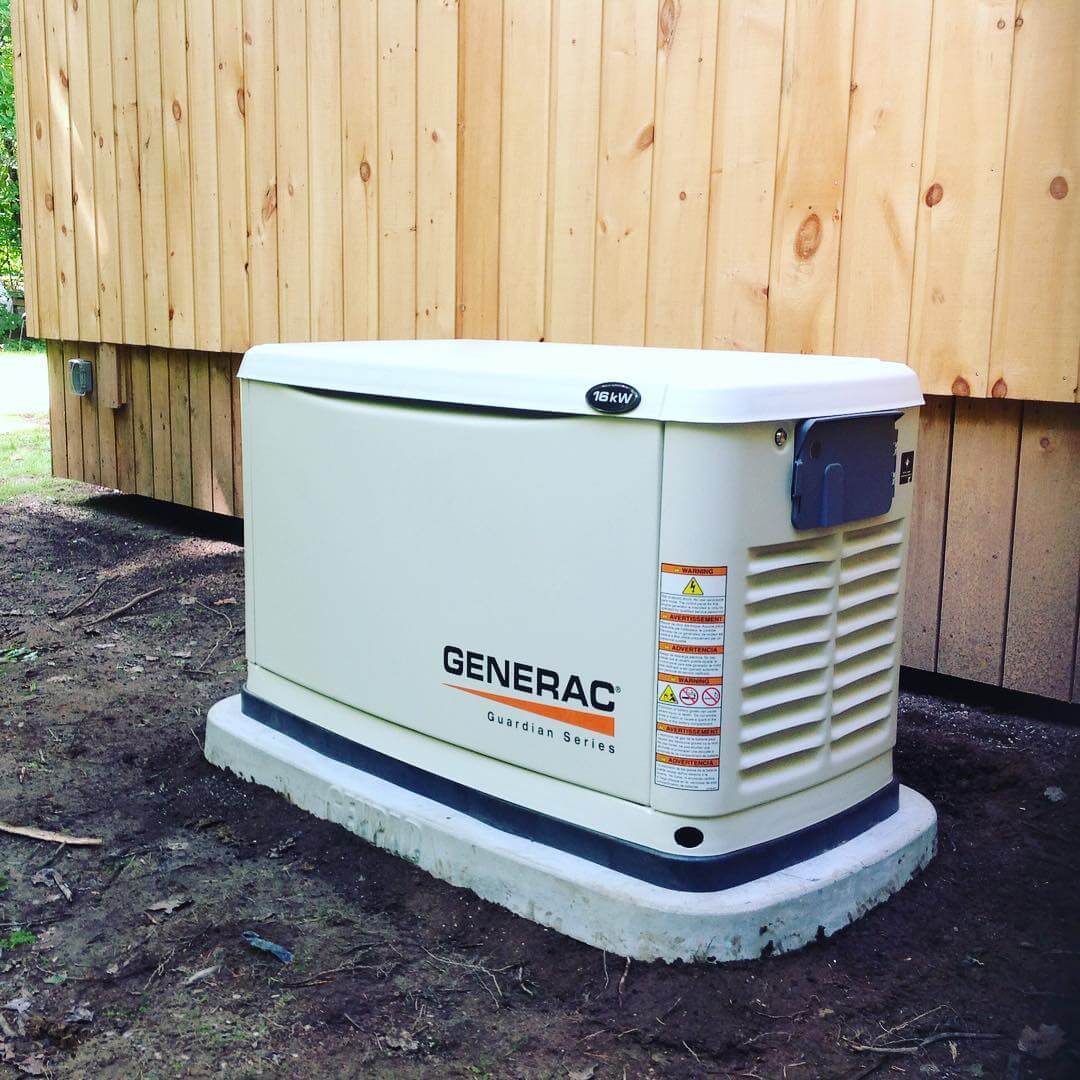
What’s the best Home Standby Generator?
If you’ve done any other research on any kind of standby generator thus far, you’ve surely heard of Generac.
They’re the renowned brand in the home generator space that manufactures high-quality standby generators that will generate an abundance of backup electrical power on demand.
As long as you’ve had a qualified electrician or electrical engineer adequately size your new Generac 70432 standby generator, you’ll have ample replacement power whenever a power out occurs.
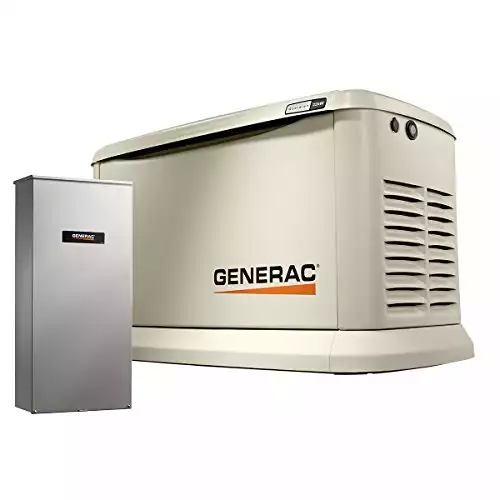 Generac 70432 Home Standby Generator Guardian Series
Generac 70432 Home Standby Generator Guardian Series
- Provides instant whole-home backup power within seconds of any mains power grid interruption.
- Equip with a handy wifi application that allows monitoring the generator's status & functionality remotely.
- Reliable and durable Generac G-Force engine is built to last and requires minimal maintenance.
- Can be sized and installed to cover just your essentials and or capable enough to power your entire home.
What Size Standby Generator Do I Need?
Ideally, you’ll want to know the exact wattage of each individual appliance in your home. You’ll then need to add up all the wattage outputs of each appliance, and then add 20% to the total sum which will give you the generator size necessary to power your home.
If you can’t gather all of that information, you at least want to know the amperage of each individual electrical appliance.
A foolproof way to determine the wattage of any electrical appliance is to utilize a simple equation called “Ohms law”. Ohm’s law is utilized by merely calculating the voltage x amperage = wattage.
So if you’re mains power supply is 120v and your appliance (say a TV) draws 3.7 amps (rated), simply multiply the two figures to give you your total wattage = 444 watts.
You always want to use this formula with the maximum rated voltage and amperage of a said electrical appliance to calculate wattage, not the operating voltage and amperage as the power supply from the grid fluctuates slightly.
If you’re working with an electrician, electrical engineer, or builder (for a new build), they will have their own system of operations for new installs. But, if you’re crunching the numbers and or want to order a generator online (without the installer’s markup), you can do the math yourself and save a few bucks.
Note, that every home electrical appliance should have a nameplate with all the relevant information you need to size a generator correctly. This nameplate will include the total wattage, so no mathematical equations should be required.
Here’s a helpful table below with some basic yet useful power factor conversions which may be beneficial:
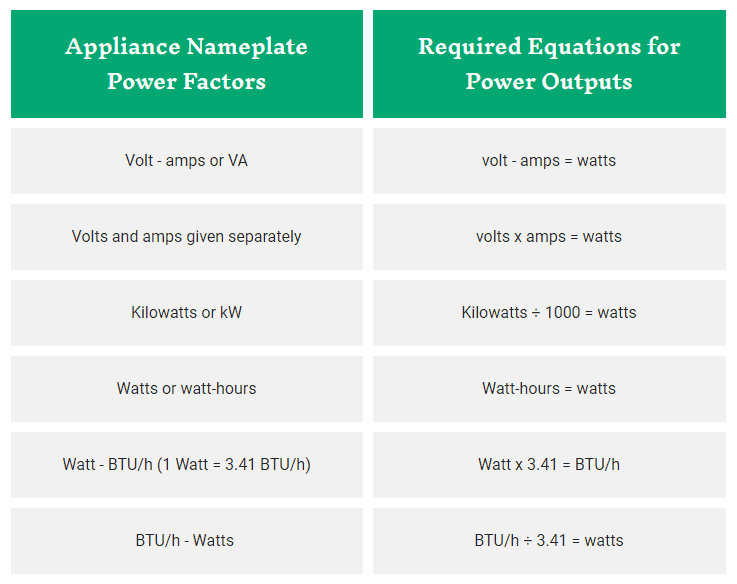
Does a Standby Generator Increase Home Value?
If you are leaning towards getting a standby generator, something you may be worried about is whether or not it is worth the cost. After all, these things cost a good bit of money, and you want to get the best bang for your buck.
So, if you install a standby generator in your home, besides the obvious benefit of keeping your home running when the regular power fails, will it increase the resale value of your home?
The answer here is a definite yes. Installing a standby generator in your home can increase the value of your home by up to 5%, and that’s no small number.
Moreover, it is shown that this is an investment that can provide a return of up to 150%. In other words, if you spend $10,000 on a standby generator, the value of your home could increase by up to $18,000.
Are Portable Generators Worth it When it Comes to Backup Power?
After getting this far, you might be thinking that it may be a better idea to get a portable generator. Of course, as the name implies, they’re portable and are a brilliant option for those who are into camping or tailgating shenanigans.
Something to consider is that portable generators can be purchased for a fairly low upfront cost, so if you need a power source for a few small appliances, these can make for cost-effective solutions.
Portable generators also tend to be quite cost-effective as they do not require any sort of professional installation.
Portable generators, while being great for emergency situations, are also ideal for being on the go. For instance, you may want to power a particular appliance in your RV or at a campsite.
Simply put, if you need a portable source of power that you can use any time and any place, then yes, portable generators are worth it.
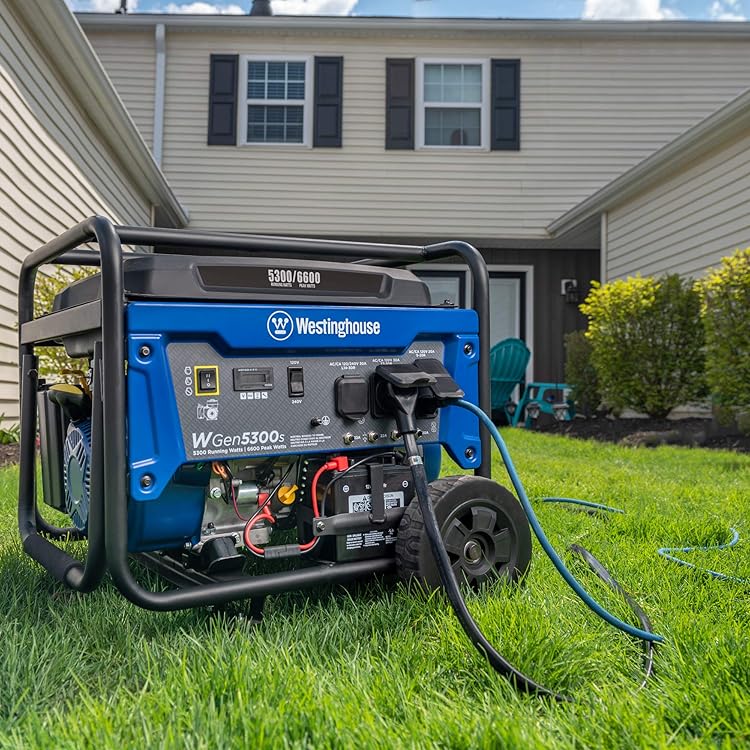
What’s the Best Portable Generator for Home Use?
Considering propane burns slightly more efficiently than natural gas, you might want to factor that into your buying decision.
That’s why when it comes to portable generators that you are contemplating using for home purposes, I’d recommend going with a dual fuel portable generator. You keep your options open for future fuel sources and address your immediate need for temporary backup power.
The one portable dual fuel generator I’d suggest you examine for your subsequent self-sufficient electricity requirements is the Westinghouse WGen9500DF.
The Westinghouse WGen9500DF is super efficient and comes equipped with an electric start and a smart sensing automatic transfer switch.
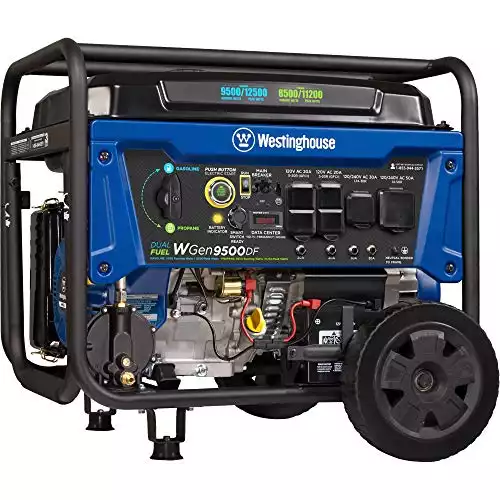 Westinghouse WGen9500DF Dual Fuel Generator
Westinghouse WGen9500DF Dual Fuel Generator
- Best in its class dual-fuel portable generator that operates either off gasoline or propane for added convenience.
- Powerful enough to power a 3-4 bedroom home for non-essential and essential appliances.
- Equipped with Westinghouse's robust 4-Stroke 457cc OHV Engine featuring a highly durable cast iron sleeve.
- Fitted with push-button electric start which makes starting this generator a breeze with an automatic transfer switch
What Size Portable Generator Do I Need?
If you’re planning on using a portable generator as a backup home generator, it will be more of the same sizing methods that were mentioned above.
Generally speaking, a 12000-13000-watt generator will maintain power as normal in a 3-4 bedroom household.
But, if you’re only purchasing a portable generator for the absolute essentials in the event of a home outage, you could also consider other factors for mobile applications.
Portable generators are brilliant for those working remotely on construction projects, RV applications, and temporary power for camping needs.
Portable Generator for Home
The only downside with sizing a portable generator for your home requirements first is that it will be more difficult to transport around for other use cases. Plus, you’ll require more fuel with a larger size portable generator, so keep that in mind.
That said, I’d still go with the larger kilowatt model when picking a portable generator, as I’d much rather not need the additional power and have it, than not have it and need it.
Just make sure to get a portable generator that comes equipped with wheels as it will be much easier to lug around.
Here’s a basic breakdown of each typical household appliance you’ll likely need to consider when powering any home generator:
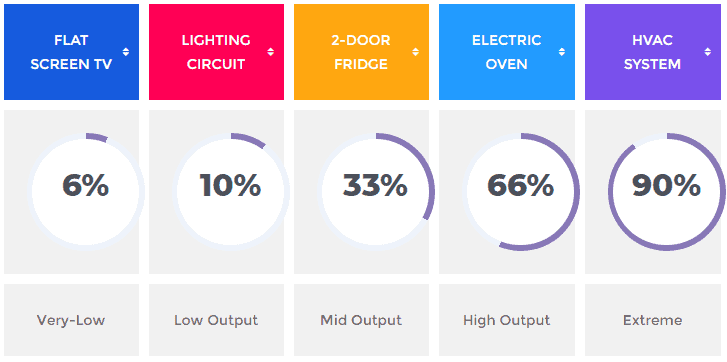
in Conclusion
There are various types of the best generators for home use available on the market, all of which are able to provide adequate alternate power sources when a power outage occurs.
While home standby generators are certainly more efficient and dependable as a backup power source, a portable generator still offers sufficient essential power at a fraction of the cost vs a standby generator.
Both of these generators have their use cases and are viable options for providing temporary power if an outage occurs. Choosing either a large portable or standby generator really depends on the size of your residence and fuel source.
Independent power via a standby generator allows complete freedom from your utility service provider when things go wrong, whereas a portable inverter generator can be utilized for relief purposes in remote locations.
Ultimately, deciding which one is right for you entirely depends on your circumstances and requirements.


